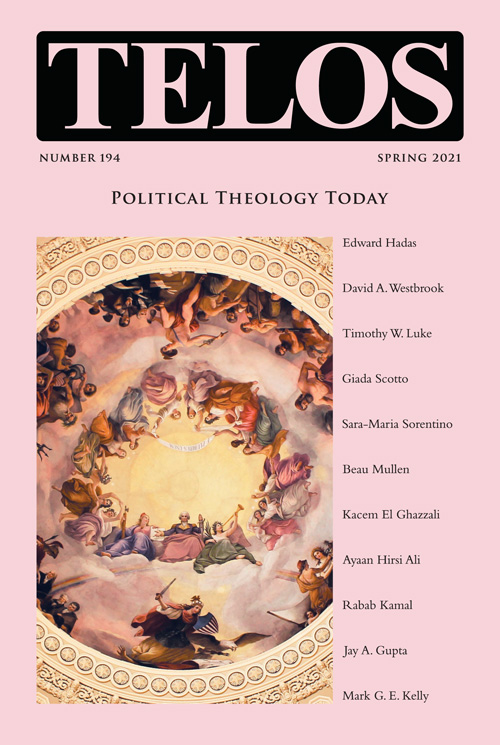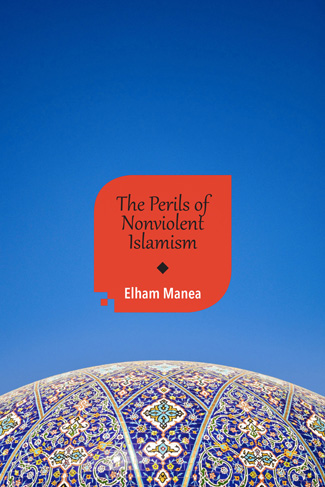In today’s episode of the Telos Press Podcast, David Pan talks with Rabab Kamal about her article “The Curious Case of Islamic Reform: Why the Concept of Holy Violence Remains Disputed and How Nonviolent Islamism Is More Than Problematic,” from Telos 194 (Spring 2021). An excerpt of the article appears here. This article was part of a group of essays in Telos 194 that discussed Elham Manea’s new book The Perils of Nonviolent Islamism, available here for 20% off the list price. To learn how your university can subscribe to Telos, visit our library recommendation page. Print copies of Telos 194 are available for purchase in our store.
|
Telos 194 (Spring 2021): Political Theology Today is now available for purchase in our store. Individual subscriptions to Telos are also available in both print and online formats.
To read more in depth from Telos, subscribe to the journal here. Writing in the Wall Street Journal, Tunku Varadarajan talks with Elham Manea about Switzerland’s recent decision to prohibit the wearing of full facial coverings in public, thereby restricting the burqa and the niqab. Manea’s new book The Perils of Nonviolent Islamism, which investigates the broader context of this decision in comprehensive detail, is now available from Telos Press in our online store for 20% off the list price. An excerpt from the article:
To read more in depth from Telos, subscribe to the journal here. Writing at the Investigative Project on Terrorism website, Phyllis Chesler reviews Elham Manea’s The Perils of Nonviolent Islamism, now available from Telos Press. Save 20% off the list price when you purchase your copy in our store. An excerpt of the review:
Now available from Telos Press Publishing: The Perils of Nonviolent Islamism, by Elham Manea. Order the paperback edition today in our online store and save 20% off the list price. Also available now in Kindle ebook format at Amazon.com. In today’s episode of the Telos Press Podcast, posted here, David Pan and Russell Berman talk with Elham Manea about her new book.
by Elham Manea Elham Manea’s The Perils of Nonviolent Islamism describes the ways in which nonviolent forms of Islamist fundamentalism in European democracies lay the groundwork for Islamist terrorism. Through a persuasive mixture of autobiography, explanatory frameworks, case studies, personal interviews, and careful readings of source material, Manea details how Islamist groups have exploited the openness of democracies and multiculturalist attitudes in order to create closed Islamist communities. These groups today are transforming Islam in the West into a unified fundamentalist religion that ultimately promotes attitudes that lead to violence. Combining keen social theoretical analysis with critical self-reflection, Manea’s interrogation of Islamism sounds the alarm on a crisis that can no longer be ignored. This essay appeared in Le Figaro on December 8, 2020, and this translation by Russell A. Berman is published with permission of the author. Hyperlinks are from the original, while footnotes have been added by the translator. Translator’s comments are here. In the face of a very real Islamist threat that has led to violence and which the proposed law on “separatism” attempts to address, it is interesting to try to raise the level of the debate. It is necessary to inquire calmly into a question that worries those thinkers least inclined to emotional reactions. In contrast to a Christianity drained of its former ambitions, why is it that Islam has not given up its virulent proselytism and instead appears to pose a threat for the future? This is a threat that de Gaulle already recognized in one of his extraordinary communications to Alain Peyrefitte, when he declared: “We are after all a European people of the white race, Greco-Latin culture, and the Christian religion.” And he considered Algerian independence necessary to prevent his village from being one day renamed “Colombey-the-two-Mosques”—which does not at all mean that he intended to exclude other “races” or religions. He understood France too well to endorse a narrow or xenophobic vision of it. |
||||
|
Telos Press Publishing · PO Box 811 · Candor, NY 13743 · Phone: 212-228-6479 Privacy Policy · Data Protection Copyright © 2025 Telos Press Publishing · All Rights Reserved |
||||




